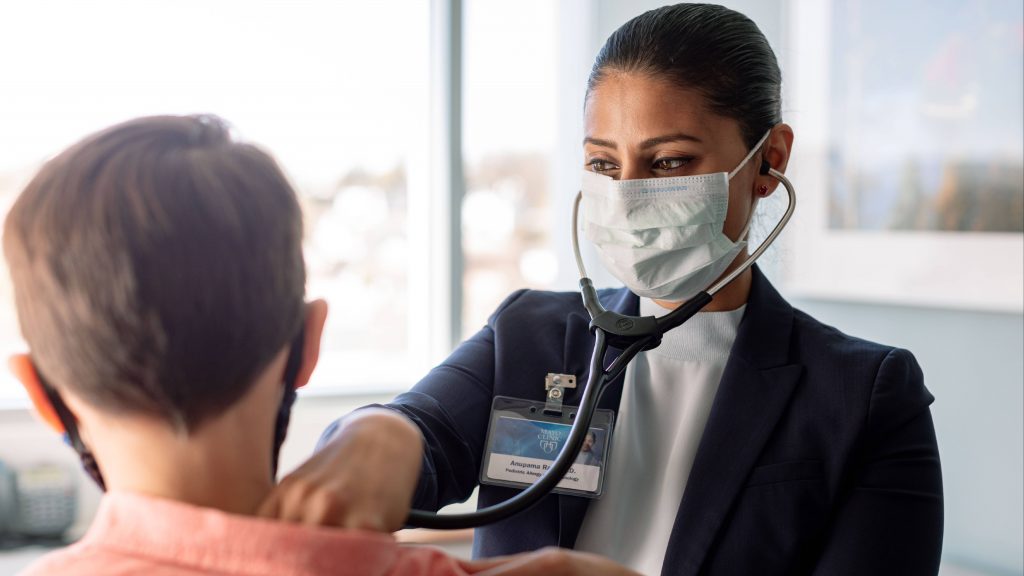
If you have held off making your well-child health appointment or have missed your child's routine vaccinations due to COVID-19 restrictions, you may want to consider putting that on the top of your to-do list.
"We have seen, over the last few months, across the country that rates of vaccines in children have dropped precipitously, and that's really concerning to us as pediatricians because it means that we are now at risk for having outbreaks of vaccine-preventable diseases," says Dr. Nipunie Rajapakse, a pediatric infectious diseases specialist at Mayo Clinic. "That's why we're really assuring parents that it is safe to bring their children to the clinic."
"At Mayo, we've had time to put systems and practices into place to help protect patients and families, and so it is now safe to start returning to get routine care, which is critically important, especially when it comes to well-child checks and vaccines," says Dr. Rajapakse.
Watch: Dr. Nipunie Rajapakse talks about importance of well-child visits
Journalists: Sound bites with Dr. Nipunie Rajapakse are in the downloads at the end of the post. Please courtesy "Nipunie Rajapakse, M.D. /Infectious Diseases" / Mayo Clinic."
Vaccines
Vaccines can prevent infectious diseases that once killed or harmed many infants, children, and adults including polio, measles, mumps, rubella, influenza, tetanus, diphtheria and pertussis (whooping cough).
"Vaccines are lifesaving interventions for children," says Dr. Rajapakse. "They prevent many serious and life-threatening infectious diseases that affect children and adults. When you have rates of vaccine that drop below a certain threshold, often referred to as herd immunity, you then set up a situation where you can start to see outbreaks of these vaccine-preventable diseases."
Measles
Measles is a highly contagions viral infection that kills more than 100,000 people a year, most under the age of 5. Measles can be prevented with a vaccine as part of the measles-mumps-rubella (MMR) vaccine.
"In the last year or two we've had large outbreaks of measles occur across the country. Once your herd immunity drops below a certain threshold, you really set yourself up in a situation where those outbreaks can occur. And, for this reason, measles is a big concern," says Dr. Rajapakse.
Whooping cough
Also known as pertussis, whooping cough, is a highly contagious bacterial respiratory tract infection. It's characterized by severe hacking cough followed by a high-pitched intake of breath that sounds like "whoop." While deaths from pertussis may be rare, it mostly occurs in infants.
"Whooping cough circulates in the community, and when you have decreases in vaccination rates, then you can see that illness affecting some of the most vulnerable groups which are very young infants, so under 6 months of age, who are susceptible," says Dr. Rajapakse. "We don't want to add that on what we're all dealing with right now with COVID-19 as well."
Schedule
Dr. Rajapakse urges parents and care-givers to ensure children are up-to-date on their vaccine schedule. The Centers for Disease Control and Prevention offers a vaccine schedule for all age groups including infants, children and adults.
Safety
Dr. Rajapakse offered these recommendations to stay safe when visiting a clinic:
- Parent and child (> 2 years of age) should wear a mask.
- Wash hands frequently or use alcohol-based hand sanitizer.
- Try and maintain 6 feet of distance in waiting rooms or other areas where other people may be around.
- Call ahead if you or your child have any symptoms of COVID-19.
- If sick, any non-urgent visits should be delayed until you have recovered and are no longer at risk for transmitting the infection to others.
If you have concerns about the safety of your healthcare provider due to COVID-19, Dr. Rajapakse says, "It's very reasonable to call your pediatrician or your family doctor's office to find out what they have put in place to help keep you and your family protected," says Dr. Rajapakse. "Many offices have gone above and beyond to try and keep their patients and families protected."
Information in this post was accurate at the time of its posting. Due to the fluid nature of the COVID-19 pandemic, scientific understanding along with guidelines and recommendations may have changed since the original publication date.
Check the Centers for Disease Control and Prevention website for additional updates on COVID-19. For more information and all your COVID-19 coverage, go to the Mayo Clinic News Network and mayoclinic.org.







